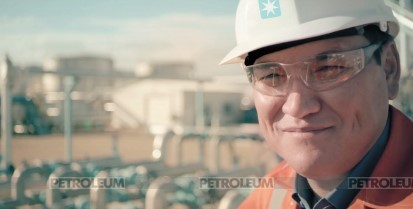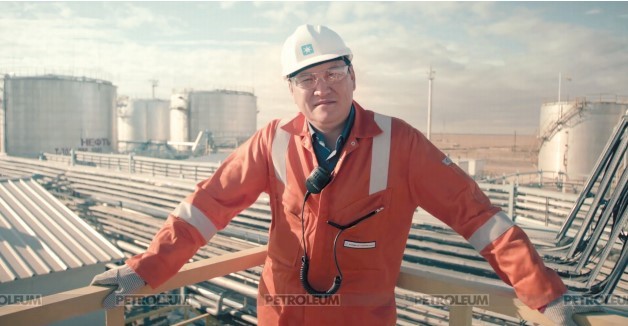KIOGE-2014
It’s Destiny
Ruslan Nugimanov is a Head of Production at the Dunga field. He was born in the Mangystau region, graduated from the Kazakh Institute of Chemical Technology majoring in Refining and Petrochemical Machinery and Equipment . His second degree is in Oil and Gas Fields Development from the Aktau State University named after Esenov. Now he is doing his MBA in the Russian State University of Oil and Gas named after Gubkin. He has been employed with Maersk Oil since 1 July 2002. Total years of experience in operations - 12 years. Ruslan is married and has 4 children - two of them are students, another one is in school and youngest one is in daycare.
Over the years since independence, many experts from the oil and gas industry have emerged from within Kazakhstan. Various factors have contributed to the establishment of this Community of Professionals which makes our country proud, among which are good education (many of our oilmen are graduates of the well-known Russian State University of Oil and Gas named after Gubkin), international internships and experience sharing, work on technically challenging projects, competitive salaries, industry development, manpower nationalisation programme, and many years of practice. Today everyone who works in the oil industry understands that continuous learning is essential to any career development. Technologies are advancing and even professionals need to keep learning to keep up with the ever changing industry.
We have interviewed an expert who could well be one such role model for the young generation. Introducing Ruslan Nugimanov, Head of Production at the Dunga field operated by Maersk Oil. Ruslan has two degrees - Refining and Petrochemical Machinery and Equipment, and Oil and Gas Fields Development. Now he is doing his MBA at the Russian State University of Oil and Gas named after Gubkin. Ruslan has 18 years of work experience in the Kazakh oil industry.
In this interview he talks about love of the profession, his motherland, the responsibility and work in the field and how important it is to learn at any age.
- Ruslan, why did you decide to work in the oil industry? What do you like about your job?
 It’s Destiny
It’s Destiny- Masculine jobs were always interesting for me in school, for example, I wanted to become a driver of a big truck, or a driller, a geologist or to work in the field. My father and uncle were drillers, so it was probably their way of life that encouraged me to become an oilman.
I never thought that oilman can work in the clean room. Now I see many examples of young professionals, who seek an opportunity to work in a clean office as soon as they graduate. In my opinion no manager will be able see the real costs of carrying out business activities without practical experience in the field.
An oilman is a man who works in the desert or offshore, watches the sunrise or sunset while working hard at the wells or processing facilities, constantly thinking of process safety and occupational hazards. It’s a man who is always focused on the job and ensuring that his site will operate properly at any moment. He is also always hungry for more oil. Words cannot properly express all emotions, only oilman can understand what I mean. In general, oil is destiny.
- What is your opinion on the Nationalisation Programme, namely an effort to replace foreign workers by locals? How successful do you think these programs are?
- I fully support this approach. In early 90s the best employees in oil companies used to be sent abroad for training. In general it was managerial staff. Nowadays things have simplified, so there is no need to travel overseas for training, it is sufficient to work in foreign companies and learn from their experience. Lack of industry professionals is not only a problem in Kazakhstan, but is critical in the world as well. We need to concentrate on training people in the oil and gas business, covering subjects such as modern industry practices and technologies, project management, and international assets management.
Effectively, I think we need to answer a very simple question - who will be working in the local and international oil and gas sector tomorrow? And what are we doing to increase the number of these people?
Some people believe that a person working in a foreign oil company brings no benefit to the country. It’s not true as every international energy company brings great economic benefit to the country, and there is local professionals’ merit in this. We need to highlight one very positive trend in foreign investments - import of new expensive technologies.
Sadly, import of new technologies slows down development of national science - for example, development of oil reserves that are hard to recover. Nation’s multimillion-dollar reserves still rest in low-permeability reservoirs. So, scientific development plays a crucial role in increasing the availability of resources.
To sum up, I would like to cite a well-known expression - in order to develop science in the country and to become an expert in your area, you need to always learn, regardless of your age.
- Why did you choose Maersk Oil, and what do you like about your current job?
- First of all, I wanted to work in a foreign company as many others. Now I’d like to say a little bit about our company Maersk Oil. It’s a company where employees are empowered to make decisions. Everything is in your hands to improve work processes, you only need to work hard and utilise company resources in the right way. I had a chance to work in other Maersk Oil business units and these ground rules and values prevail everywhere.
Our company employs highly educated local and foreign experts, and as a team we need to develop the field in the most effective way to increase oil production. We should not stop and rest on stability, there must be constant progress. I consider myself a part of this process.
I started up as an operator and grew to be a head of production within those 18 years of work. I enjoy responsibility at work - I am fully responsible for production in the Dunga field and for safety and wellbeing of our field employees who tirelessly work to produce more of the black gold.
 It’s Destiny
It’s Destiny
- How important it is to continue studying in your profession? You’ve got a second degree, was it really that important for your career? What trainings and workshops did you take and what are the other means to improve your professional knowledge?
- Back in the 90s the government planned to build a refinery in the Mangystau region. So after graduating from high school I chose refining for that reason. Unfortunately, the plant construction plan was canceled. I had to retrain and I got my bachelor’s in Oil and Gas Fields Development, since I decided to stay in the oil industry. Now I am preparing for my MBA thesis. I think everyone has to learn throughout their lives, just to keep abreast with industry developments.
- What are your professional plans for the future?
- Professionally, I hope to make my contribution to the development not only of our company and our oilfield, but also to the development of the Kazakhstan’s oil and gas industry as a whole. I know it can be done – there are so many talented young professionals and we have all the right tools to do so. Together with the team you can move mountains. And, of course, I will keep learning.
Of course, I will need to, raise my children and most importantly provide for their education. Other than that, I don’t have plans yet.
Interviewed by Amina Dzhalilova
Published the full text of the article



